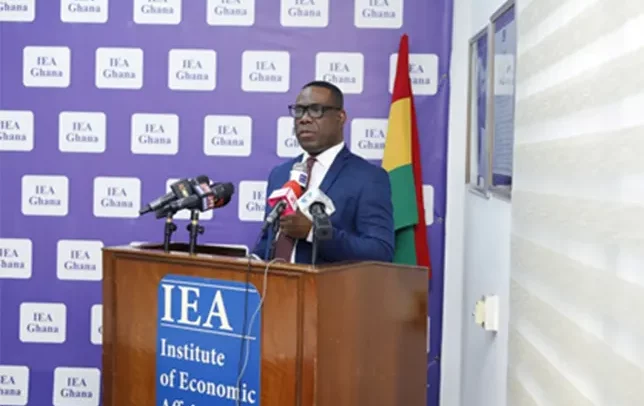Dr. Eric Oduro Osae
The Institute of Economic Affairs (IEA), has called on the government to adopt a national policy prohibiting the granting of new mining leases and the extension of existing ones to foreign entities.
Speaking at a Press conference yesterday in Accra, IEA Senior Fellow, Dr. Eric Oduro Osae, proposed that the State should rather restrict future mining leases to promote local ownership to retain more value for its mineral wealth.
He said, “Future mining leases should be restricted to Ghanaians through strategic public-private partnerships that ensure local control, maximise value retention, and deliver long-term national benefits.”
According to the IEA, Ghana possesses significant technical and managerial capacity in the mining industry and should harness this expertise to manage its mineral resources independently adding that in cases where specialised skills are needed, foreign firms should be contracted only on a service basis, under competitive, time-bound agreements.
The IEA also pointed to South Africa’s Black Economic Empowerment Programme (BEEP) as a possible model, noting that despite its challenges, the programme has succeeded in increasing local ownership in key sectors, including mining.
“This model will ensure that full ownership of mining operations and revenues remain with the state or Ghanaian entities,” he stated.
The IEA also called for an urgent review of Ghana’s Minerals and Mining Act, 2006 (Act 703) and the Petroleum (Exploration and Production) Act, 2016 (Act 919), noting that the current legal frameworks overly favour foreign interests and deprive the country of a fair share of its resource wealth.
Touching on the Damang Mine, Dr. Osae also urged the Minerals Commission to consider only Ghanaian investors when awarding a new lease for the Mine, proposing that the country should leverage on local expertise and limit foreign involvement in mining to short-term service contracts.
Dr. Osae further recommended that the government issues formal notices in advance to foreign companies whose leases are almost expiring in order to initiate plans to transfer operations to Ghanaians.
He stressed that Ghana earned $2.3 billion from gold exports valued at $11.6 billion, a return of less than 20%, after more than a century of allowing foreign control over its mineral resources under colonial era contract frameworks.
Dr. Osae said such revenue shortfall has contributed to the country’s continued fiscal instability, high debt levels, and dependence on external aid resulting in overreliance on borrowing.
By Ebenezer K. Amponsah


